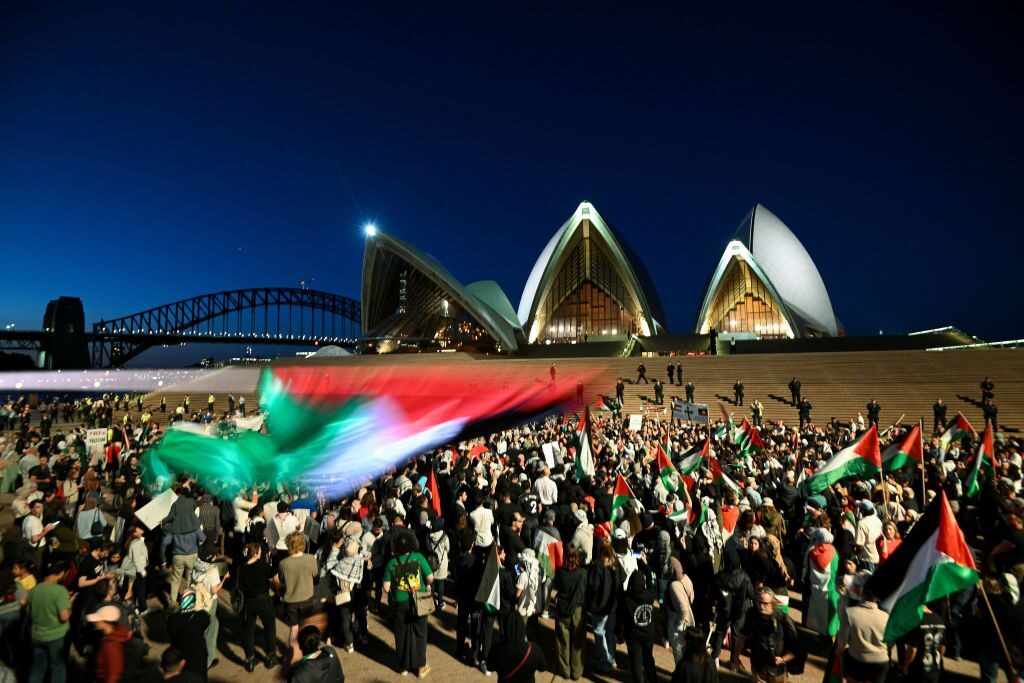Australian Prime Minister Anthony Albanese said on Monday that his administration will craft legislation to ban the practice of doxxing after a group of pro-Palestinian activists leaked personal information about hundreds of Australian Jews, including their names, photos, and employment information.
“I’ve asked the attorney general to bring forward legislation in response to the privacy act review, including laws that deal with so-called doxxing, which is basically the malicious publication of private information online,” Albanese said in an interview with Nine Radio.
Albanese added that Attorney General Mark Dreyfus is looking at ways to “strengthen laws against hate speech” following the incident.
Dreyfus said his proposals would amend existing privacy laws to criminalize the malevolent use of personal data.
“The increasing use of online platforms to harm people through the malicious release of their personal and private information is a deeply disturbing development,” he said. “The recent targeting of members of the Australian Jewish community through doxxing was shocking, but sadly a far from isolated event.”
The incident that rocked the Australian government involved a group of pro-Palestinian activists obtaining and leaking the membership roster and chat logs of a private WhatsApp group formed by around 600 Jewish writers, artists, and academics last year.
The material published by the pro-Palestinian activists, who became infuriated with Jews after Israel responded to the October 7 Hamas atrocities, included a good deal of personal information about the members of the Jewish chat group that could be used to harass them, including details of their employment, social media accounts, and even photos of about one hundred members.
The leakers evidently made no effort to authenticate the information they leaked. Some of the people named in the leaked data files said they were not members of the WhatsApp group and, although Jewish, they considered themselves outspoken critics of the Israeli government.
“I am not a Zionist, I have never been a Zionist, I am just a Jewish woman trying to go about my life. This is a group of any Jew they know the name of. I can’t believe it is happening,” said one of the people doxxed by the pro-Palestinian activists.
One of the ringleaders of the doxxing group, feminist writer Clementine Ford, was unapologetic about publishing the personal data of the Australian Jews.
“This is a group of ‘creatives’ working to silence voices calling for Palestinian liberation,” Ford declared.
“I would say that people whose livelihoods and professional reputations are mendaciously – and successfully – targeted in secret by others invested in silencing their criticism of a genocide are entitled to defend themselves,” she said.
Ford was evidently referring to the case of an Australian Broadcasting Corporation (ABC) broadcaster named Antoinette Lattouf, who was fired by the network in December after it received numerous complaints about her work being biased against Israel.
Lattouf was warned about these complaints, but proceeded to repost an Instagram post from Human Rights Watch (HRW) accusing Israel of using “starvation of civilians as a weapon of war in Gaza.” She was quickly fired after the Instagram repost.
Lattouf, who is Lebanese-Australian, filed a wrongful termination complaint against ABC in which she claimed she was discriminated against because of her race and political views. She also accused the Executive Council of Australian Jewry (ECAJ) of orchestrating a campaign to get her fired, a charge both ABC management and the ECAJ denied.
“The ECAJ does not write the ABC’s code of practice nor does it enforce it. Perhaps this is a case of people power prevailing upon the ABC and our national broadcaster deciding correctly that activism and journalism are not the same thing,” ECAJ co-chief executive Alex Ryvchin truculently suggested after Lattouf filed her wrongful termination complaint.
Ryvchin said last week the “Jew list” compiled and published by Ford and her fellow activists was meant to terrorize people who spoke out against rising antisemitism in Australia after the October 7 attacks in Israel.
“These people have painstakingly collected the names, faces, professions and other personal information of a group of Australians whose sole common trait is that they are Jews. They are telling those who chant ‘Where’s the Jews?’ exactly who and where the Jews are,” he said.
Ryvchin was alluding to the shocking pro-Hamas demonstration at the Sydney Opera House on October 9, whose participants shouted slogans such as “Where’s the Jews?”, “Gas the Jews,” “F**k the Jews,” and “Allahu Akbar.” The rally openly celebrated Hamas murdering, torturing, and raping hundreds of innocent Israeli civilians, including children.
The Australian government was heavily criticized for telling Jewish citizens to hide in their homes while the Hamas supporters put on their bloodthirsty display, rather than dispersing the rabidly antisemitic protest. Federal and local officials have been scrambling to control the political fallout and reassure Jewish citizens of their safety ever since.

Protesters show their support for Palestinians during a rally in front of the Opera House in Sydney on October 9, 2023. (IZHAR KHAN/AFP via Getty)
Author Lee Kofman, one of the organizers of the Jewish WhatsApp group, said it was founded to give support and comfort to Jews who felt apprehensive about the rising tide of anti-Semitism in Australia. She said it was “absurd and offensive” for pro-Palestinian activists to characterize the group as a “secret Zionist cabal.”
Kofman said the group is not a political organization, but some of its members were among those who complained to ABC about Lattouf’s biased journalism, acting on their own initiative.
Prime Minister Albanese agreed with Kofman’s description of her group and denounced the pro-Palestinian activists for “targeting” them.
“Now these people have a range of views about the Middle East. What they have in common, though, is the fact that they’re members of the Jewish community,” Albanese said on Monday.
“And the idea that in Australia, someone should be targeted because of their religion, because of their faith – whether they be Jewish, or Muslim or Hindu or Catholic or Buddhist – is just completely unacceptable,” he said.
Opposition Leader Peter Dutton agreed on Friday that the WhatsApp doxxing was appalling and a strong government response was appropriate.
“Frankly, if that is not something the police are looking at now, then I believe they should urgently look at it,” Dutton said.
“If the laws need to be beefed up then they should, because it shames me to say that people of Jewish faith in our country at the moment, many of them living with great angst, and we’ve seen a situation where security has been bolstered at Jewish schools at synagogues, at supermarkets, that has no place in our country in the 21st century at all,” he said.
ECAJ President Daniel Aghion said stronger laws were needed to discourage the malicious release of personal information.
“While existing laws outlaw the use of social media platforms to menace and threaten others, the doxxers themselves, who orchestrated a campaign of intimidation, violent threats and horrific abuse, cannot be allowed to get away with it,” Aghion contended.
“We have called for an end to the impunity and we are grateful that the government has listened,” he said. “We look forward to working with the government to ensure the full extent of the harm caused is understood and that the new laws effectively protect Australians from this shameful and dangerous practice.”
Aghion suggested a good first step would be calling on social media platforms to “permanently deactivate” the accounts of the doxxers.
“Social media is intended to connect individuals and communities and allow the rapid exchange of information. Where accounts are used to threaten the lives and livelihoods of others, the platforms have a duty to act,” he said.
Josh Burns, a member of Parliament from the governing Labor Party, said last Thursday that some of the people on the leaked WhatsApp group list have received death threats and one family has been forced into hiding.
Ford remained defiant, castigating Albanese for supposedly turning his back on the suffering Palestinians of Gaza to indulge Australia’s Jews in “the demonization of people who cannot stand to see any more children be killed.”
“This fixation on rewriting narratives in order to obfuscate the truth is yet another tactic to conceal Israel’s genocide of Palestinian people in Gaza,” she sneered. “How many more children need to die before Albanese remembers he once had a backbone?”
Ford also rejected the description of her group’s actions as “doxxing.” Instead, she insisted those who published the WhatsApp transcripts and private information should be seen as “whistleblowers” who exposed a conspiracy to “target and harm the reputation of good and just people, some for simply being Palestinian, and almost all for calling for an end to the genocide against the people of Gaza.”
Monash University cybersecurity professor Nigel Phair noted that it could be very difficult to square laws against doxxing with privacy and free speech protections, and in any event, it would be hard to catch determined perpetrators.
“It’s pretty easy to set up social media profiles to share this information, and use jurisdictions far from where you live, to use devices that you don’t normally do, and basically obstruct who you are, so actually trying to find who the people are that have released the information is super difficult,” he said.
Phair suggested it was up to social media platforms to prevent doxxing and swiftly delete improperly exposed personal data.
“Our law enforcement agencies, dare I say, are already swamped with online investigations with the amount of crime that we have online. Adding this to it without any additional resources and the really integrated work with the social media platforms – it just won’t do much,” he said.

COMMENTS
Please let us know if you're having issues with commenting.